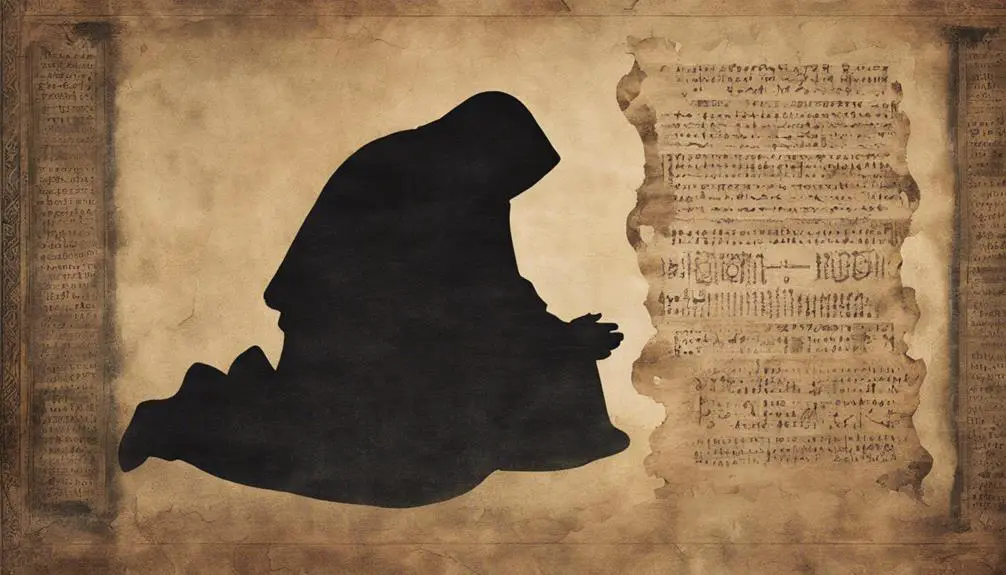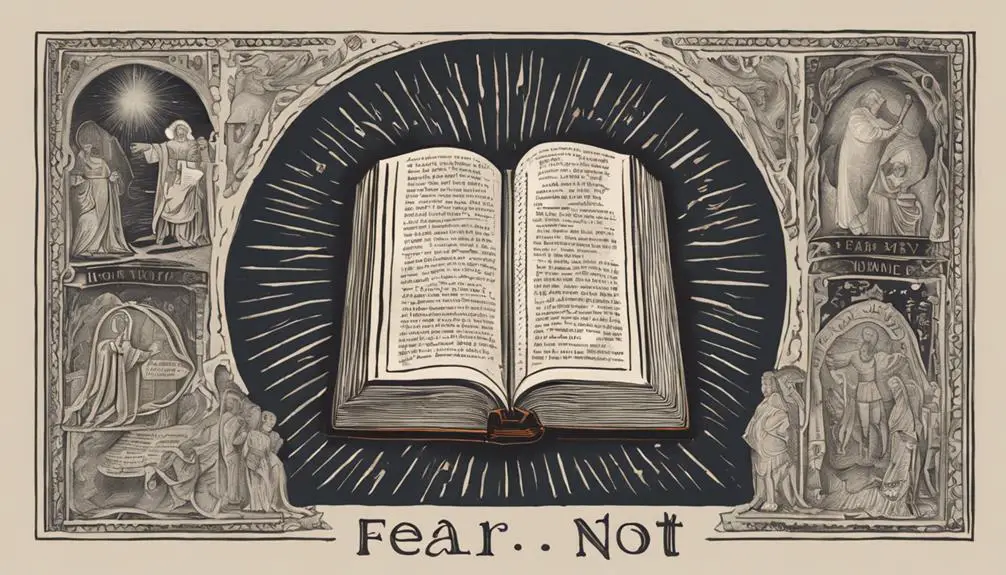Mine spiritual wisdom from the Bible's most frequent command, 'Do not fear', and explore its historical, spiritual, and contemporary significance.

Most Common Command in the Bible
Peeling back the layers of the Bible is like mining for gold; you've got to sift through a lot to find the nuggets of wisdom. One gem that shines brightly, and quite often, is the command 'Do not fear'. It's whispered softly in hushed tones, roared loudly from mountaintops, and echoed throughout the ages.
Why is this command so ubiquitous? Let's embark on an exploration to understand its historical context, spiritual implications, and how it resonates in our lives today. There's a world waiting to be unlocked in these three simple words: Do not fear.
Key Takeaways
- 'Fear Not' is the most repeated command in the Bible, symbolizing faith and trust in God during uncertain times.
- The command plays a significant role in biblical stories, encouraging individuals to rise above fear and follow God's plan.
- 'Fear Not' carries implications for mental and emotional well-being, helping individuals navigate fear-based obstacles and promote a positive outlook.
- Modern interpretations of 'Fear Not' demonstrate its timeless relevance and enduring power, influencing decision-making, relationships, and confidence.
Fear Not': Biblical Occurrences

Diving deep into the scriptures, you'll discover that the command 'Fear Not' surfaces frequently, revealing its profound significance in the biblical narrative. It isn't a mere suggestion, but a command, often issued by God or His messengers during times of uncertainty or fear. This command serves to reassure, to comfort, and to embolden. It's a call to trust in God's sovereignty, acknowledging His perfect control over the events in our lives.
The Biblical symbolism of fear is multifaceted. It can signify doubt, lack of faith, and even disobedience. Conversely, the command 'Fear Not' is a symbol of faith, trust, and obedience to God. It's a directive to release anxiety and embrace peace.
'Fear Not' in popular culture is often evidenced in artistic and literary work as a beacon of hope and calming reassurance. It's frequently referenced in sermons, songs, books, and even on social media as an antidote to the pervasive anxiety and fear that plague modern society. The timeless truth of this command continues to resonate, reminding us that fear doesn't have the final say.
Historical Context of 'Do Not Fear

To fully grasp the depth of the command 'Do Not Fear', it's crucial to delve into its historical context, understanding the circumstances and culture in which these words were first spoken. This command wasn't delivered casually. It was spoken in turbulent times, times of desolation and despair, where fear was a constant companion.
The cultural significance of 'do not fear' was profound. This command represented a beacon of hope and strength. Let's look at it through this table:
Era |
Circumstances |
Societal Reactions to 'Fear Not' Command |
|---|---|---|
Exodus |
Israelites' escape from Egypt |
Encouragement in times of uncertainty |
Babylonian Exile |
Israelites' exile to Babylon |
Comfort during displacement |
Roman Occupation |
Israel under Roman rule |
Hope amidst oppression |
Early Church |
Persecution of Christians |
Courage to maintain faith |
Modern Era |
Global tensions and crises |
Continued reassurance and hope |
Society reacted with a mix of relief, hope, and strengthened faith. The command 'do not fear' became a mantra for survival and resilience, a call to hold onto faith despite the troubles that loomed. It's evident that 'do not fear' is far more than a simple command—it's a lifeline given in times of dire need.
Spiritual Implications of Fearlessness

Unpacking the spiritual implications of fearlessness, you'll find it's more than a personal trait; it's a divine call to trust, embodying faith in the face of adversity. Fearlessness symbolism, particularly in the biblical context, isn't merely about braving physical dangers, but also overcoming spiritual barriers that inhibit your relationship with the divine.
Fearlessness in meditation allows you to confront these barriers head-on, promoting a deeper, more authentic spirituality. This isn't about reckless bravado or inability to recognize danger, but a serene confidence anchored in divine assurance.
Digging deeper, you'll notice fearlessness is a spiritual tool for growth. It's a lens through which you perceive and react to life's challenges, pushing you beyond comfort zones into transformative experiences. It's about fostering resilience, resisting despair, and embracing the unknown, all while maintaining an unshakeable trust in divine providence.
Role of 'Fear Not' in Major Biblical Stories

In the narratives of the Bible, the command 'Fear Not' plays a pivotal role, often serving as a divine reassurance in the midst of daunting circumstances. You'll notice it's not just a comforting phrase, but it's also a call to action, challenging the faithful to rise above their fear and trust in God's plan. Fear's impact on faith is significant, as it can either cripple or strengthen spiritual resilience depending on how it's managed.
The role of 'Fear Not' in biblical stories often sets the stage for extraordinary happenings, as seen in the encounters of Moses at the burning bush, Daniel in the lion's den, or Mary at the Annunciation. In each case, 'Fear Not' signals a transformative moment, an invitation to courage and faith in the face of the unknown.
The role of courage in these biblical narratives is undeniable. It's the catalyst that drives individuals to confront their fears, step into their destinies, and trust in the divine plan. Understanding the role of 'Fear Not' in these stories deepens your appreciation of these tales and enriches your understanding of faith's strength in overcoming fear.
Psychological Perspective on 'Do Not Fear

From a psychological standpoint, 'Do Not Fear' carries profound implications for your mental and emotional wellbeing, potentially influencing your resilience in the face of adversity. This command can serve as a cognitive tool, guiding you towards overcoming fear-based obstacles that might hinder personal growth.
Fear's evolutionary role shouldn't be dismissed, though. As a primal emotion, fear acts as a survival mechanism, alerting you to potential threats. But when fear becomes chronic, it can lead to debilitating anxiety disorders. From this perspective, 'Do Not Fear' might be interpreted as a call to manage fear effectively, not to eradicate it entirely.
Applying 'Do Not Fear' in a psychological context doesn't suggest ignorance of genuine threats. Rather, it encourages you to confront fears, acknowledging them as part of the human experience. This approach mirrors therapeutic strategies in treating anxiety disorders, where patients are taught to face, rather than flee from, their fears.
In essence, 'Do Not Fear' offers a blueprint for emotional regulation. It urges you to master fear, rather than be its servant, fostering resilience and psychological wellbeing. This interpretation aligns with current psychological research, solidifying its relevance in today's world.
Modern Interpretations and Applications

Building on the psychological implications, it's fascinating to explore how 'Do Not Fear' is interpreted and applied in a contemporary context. Biblical translations of 'fear not' vary, but the command remains consistent in its urging to trust and not be afraid. This command, prevalent in ancient scripture, has found its place in the modern world, particularly resonating with the millennial generation.
Millennial engagement with 'fear not' is notable. This generation, often characterized by uncertainty and change, has found solace in this command. On social media platforms, it's common to encounter millennials sharing 'fear not' verses, applying them to current issues and personal struggles.
In this digital age, where fear is often amplified, the 'fear not' command serves as a counterpoint, a reminder of trust and courage. It's a call to reject the fear that can paralyze and instead, lean into faith. This modern interpretation and application of 'fear not' demonstrate its timeless relevance and profound impact across generations and cultures. It's a testament to the enduring power and adaptability of biblical teachings in a changing world.
Personal Reflections on 'Fear Not' Command

Reflecting on the 'Fear Not' command, you may find it strikes a personal chord, particularly in times of adversity or uncertainty. This biblical directive, occurring over 300 times, is an assurance of protection, a call to trust, and a beacon of hope. Its impact on personal decision making is profound. When you internalize it, you're emboldened to take risks and make tough choices, knowing you're not alone.
The command 'Fear Not' also influences your interpersonal relationships. Fear can breed mistrust, conflict, and isolation. But when you heed this command, your relationships can thrive on trust and openness. Understandably, it's not easy to shed fear completely. It's a human emotion, after all. Yet, embracing this command helps you manage fear, rather than letting it rule you.
Frequently Asked Questions
How Does the 'Fear Not' Command Differ Across Various Translations of the Bible?
When you examine different translations of the Bible, you'll notice variations in the 'fear not' command. These changes may impact how you apply 'fear not' in daily life and its influence on mental health.
Some versions use 'do not be afraid', while others say 'be not afraid', altering the emphasis slightly. This linguistic diversity can affect the meaning and the way it's internalized, potentially influencing your anxiety levels and coping mechanisms.
What Is the Significance of the 'Fear Not' Command in Other Religious Texts Outside of Christianity?
You're exploring the significance of 'fear not' in other religious texts outside of Christianity.
In Buddhism, 'fear not' suggests overcoming life's impermanence, suffering, and ego-self.
The Islamic interpretation of 'fear not' often correlates with trusting in Allah's plan and power.
These contexts highlight the universal appeal of this command, encouraging strength in the face of adversity in varied spiritual perspectives.
Are There Any Controversies or Debates Regarding the Interpretation of the 'Fear Not' Command Among Biblical Scholars?
Yes, there are debates among scholars concerning the 'Fear Not' command. Some argue that in apocryphal texts, 'Fear Not' holds different implications. They believe the historical context influences its interpretation. For instance, it may signal an upcoming divine intervention.
Others believe it's a universal command, regardless of the context. As you delve into biblical studies, you'll find differing viewpoints on many aspects, including the interpretation of 'Fear Not'.
How Has the 'Fear Not' Command Influenced Modern Day Christian Practices and Traditions?
You'll find the 'fear not' command deeply ingrained in modern Christian practices. It's often used in Christian parenting, encouraging children to trust in God's protection.
In Christian counseling, it's a cornerstone, helping individuals to overcome fear and anxiety. This command fosters faith and courage in daily Christian life, influencing not only personal growth but also communal traditions and practices.
What Are Some of the Ways the 'Fear Not' Command Has Been Represented in Art, Literature and Popular Culture?
You've likely seen the 'fear not' phrase expressed in diverse forms of art, literature, and popular culture. It's often portrayed to inspire courage and resilience.
For instance, in literature, characters may face daunting challenges, yet 'fear not' serves as their mantra. In psychology, this phrase implies mental strength and is often used to combat anxiety disorders.
It's fascinating how this simple command has such profound implications for mental health.
Conclusion
In examining the command 'Fear Not', you've journeyed through its biblical frequency, historical context, spiritual meanings, and modern implications. You've seen its pivotal role in biblical accounts and psychological impact.
The invitation is to embrace fearlessness in your life, drawing strength from this ancient command. Reflect on it, allowing it to guide and comfort you.
'Fear Not' is more than a command; it's a divine reassurance, a testament to enduring human resilience.



Sign up